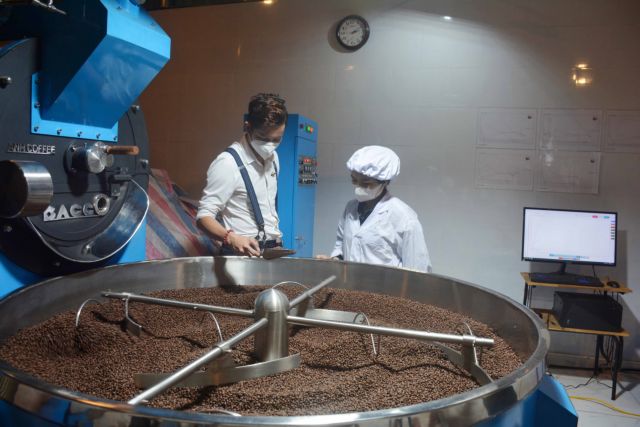The UKVFTA, effective from January 1, 2021, is expected to continue bringing opportunities for Việt Nam to expand coffee exports in the future.

Viet Nam's coffee exports to the UK are growing rapidly and look set to continue expanding thanks to the increasing demand of British consumers and the United Kingdom-Viet Nam Free Trade Agreement (UKVFTA).
The UKVFTA, effective from January 1, 2021, is expected to continue bringing opportunities for Viet Nam to expand coffee exports in the future.
Trade value growth from agricultural products, and in particular coffee, is forecasted this year to be positive, thanks to the recovery of the UK economy, the efforts of Vietnamese businesses and the support of national trade promotion programmes.
In the future, the Ministry of Industry and Trade will promote its support for Vietnamese enterprises in connecting importers in the UK to expand their share in those markets.
Statistics from the General Department of Customs show that Viet Nam's coffee exports to the UK have varied month to month however, coffee exports to the UK in the first half of this year increased by two times, reaching a total volume of 30,609 tonnes, 2.38 times more total value at $61.9 million over the same period of last year.
The Import-Export Department, Ministry of Industry and Trade (MoIT), said Viet Nam gained growth in coffee exports in the first half of this year because local enterprises quickly took advantage of the UKVFTA.
According to the commitments of UKVFTA, 100 per cent of tariffs were eliminated on January 1, 2021 for coffee, natural honey, fruit juices, fresh flowers, as well as both fresh and processed fruits and vegetables exported from Viet Nam to the UK.
Therefore, Vietnamese businesses must quickly take this advantage to promote their coffee exports to this market, according to the Ministry of Industry and Trade.
It also said that, at present, the UK is ready to open the domestic market for other nations willing to sign free trade agreements.
In addition, the UK also wishes to join the Comprehensive and Progressive Agreement for Trans-Pacific Partnership (CPTPP), to open its market up to the products of the 11 CPTPP member countries, brining advantages to British export products. However, such a move would provide strong competition for Vietnamese products in the UK market from other CPTPP exporters.
Luong Hoang Thai, director of MoIT's Multilateral Trade Policy Department, said that the implementation of the UKVFTA has partly helped the two countries overcome the difficulties of the COVID-19 pandemic, including the suspension of supply chains.
According to Nguyen Khanh Ngoc, deputy director of MoIT's European-American Market Department, many Vietnamese agricultural products are sold at UK supermarkets. However, local enterprises need to invest in enhancing their brand's reputation in this market.
In addition, according to Ngoc, to take benefit from the UKVFTA, the local enterprises must organise the production of the export products under British and European standards. They also need to actively build and develop partner relationships with large distribution groups.
Especially, they must use preservation technology and transport agricultural products by sea.
Particularly for coffee, the UK market is very competitive with imports from many countries. To keep stability in coffee exports to the UK, the Vietnamese coffee industry needs to meet increasingly stringent requirements as well as the consumer tastes of the British people.
Besides that, Vietnamese coffee enterprises should offer products that use modern processing technology to increase product quality.

Tran Thai, director of T&T Meridian Company in the UK, said coffee trading companies in the UK know that Viet Nam is one of the world's leading exporters of coffee beans. However, Viet Nam does not have brands for finished coffee products, like Italy, France or Switzerland.
In addition, Viet Nam's Robusta coffee beans are mostly of low quality, while price competition is no longer appropriate, according to a coffee industry expert.
To meet the needs and tastes of British consumers as well as to penetrate further into this market, the local enterprises need to invest in producing high-quality Arabica coffee from small-scale growing regions. They also must have abilities of governance, traceability and more sustainable development.
Marketing is the biggest challenge for Vietnamese businesses. To access the UK market more conveniently, businesses need to invest in marketing activities, according to an expert in coffee export.
MoIT noted that the UK is the fifth largest coffee-consuming market in Europe, after Germany, Italy, France and Spain. The total value of coffee consumed in the UK annually is about GBP3.9 billion. However, due to the COVID-19 pandemic, UK coffee imports in the period 2020 - 2021 decreased sharply.
According to the Import-Export Department, Viet Nam's coffee exports to the UK in 2021 reached 34,650 tonnes, worth US$66.2 million, down 35.5 per cent in volume and 31 per cent in value compared to 2020.
Vietnamese coffee accounted for about 17 per cent of the market share in total UK coffee imports, down 6 per cent year on year. — VNS





